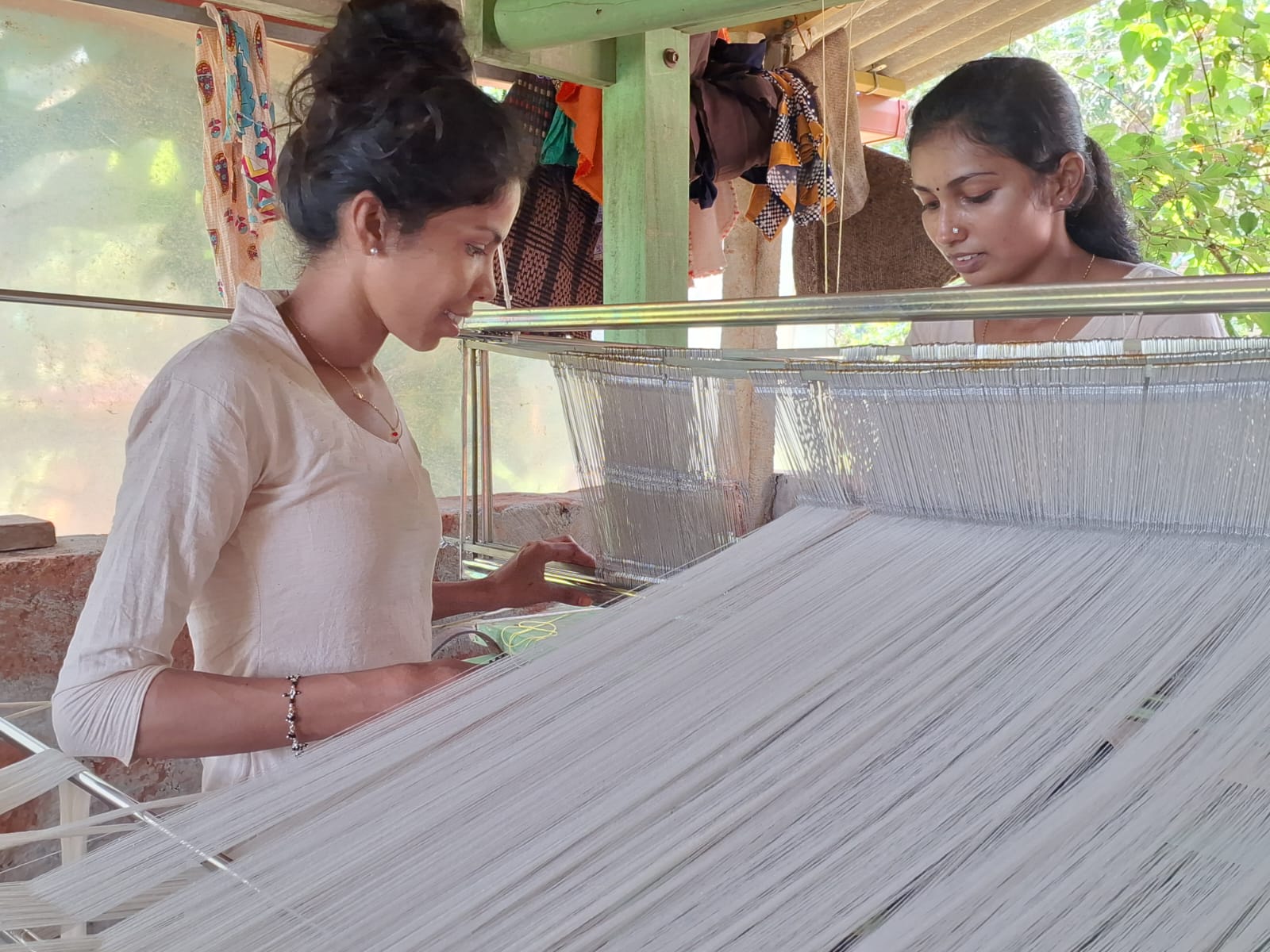The enthusiasm and fervour among a group of about 9 women and 3 men is unmissable as they gather around the large Renje aka Bagal/Bakula tree (bullet wood tree) in the community’s sacred grove in Hoseri. They are all a part of the ingenious ‘Bagal Bandhugalu’ initiative which is a brainchild of the Kadike Trust, spearheaded by their president Mamatha Rai. Hoseri is a seemingly non-descript hamlet in Yelajith village near Byndoor in Udupi district.

This remote hamlet is today abuzz with the rhythmic clacking and clicking sounds of looms operated by hand. Weaving has indeed been a life changing experience for this group who had to travel long distances for work given that there were no local employment opportunities in the hamlet. With new found confidence and joy in working together as a community, weaving has given them not only financial independence but also a sustainable livelihood. “The feeling of being independent and not having to ask money from other is indeed a morale booster and all this is thanks to handloom weaving” says Suneeta, 22.

Sustainable Employment Opportunity
The ‘Bagal Bandhugalu’ initiative is the second project of the Kadike trust with the revival of the Udupi sarees being the first. “We started the Bagal Bandhugalu project as many people in Hoseri were interested to take up weaving. They were motivated by Saroja Naik who trained under us during the Udupi saree revival project. She is also a trainer and incidentally lives in Hoseri. Given the zeal of the participants, we started the training on Gandhi Jayanti in 2023 in Saroja Naik’s loom shed even though there were initially less than 10 participants. We also received a few used looms as well and they were refurbished for the purpose of training” mentions Rai. It is key to note that none of the participants had any background in weaving and the training was started with Saroja Naik and was supervised by master trainer Chandran from Trivandrum”.

Apart from actual weaving, the trainees were also apprised about the values of handlooms, sustainability and ecofriendly practices so that they could put the whole exercise into perspective. The training was flexible in that participants were free to learn at their own pace and while balancing their other tasks like farming. “We feel that life has a new purpose now and is more meaningful. Although we lived initially in the city, moving back to our native Hoseri and doing weaving along with farming has been way more satisfying” say husband-wife duo Vasanthi (35) and Sateesh (43).

Naturally Dyed Fabrics
All fabrics produced under the Bagal Bandhugalu initiative are naturally dyed. “We procure the yarn from Tamil Nadu and it is naturally dyed using substances like areca nut, pomegranate peel, madder root, indigo, marigold etc. This is supplied to the weavers who in turn make products like towels, stoles and lungis. Each product comes with a label bearing the weaver’s photo and details of the product” adds Mamatha.

Marketed under the name ‘Kadike Handmades’, the response for these products has been extremely encouraging and has been appreciated by reputed institutions like Krishi Vigyan Kendra, Manipal Academy of Higher Education and IIMB. “It is perfect for gifting and we have had many orders where these stoles were purchased to gift students as part of their convocation. We also had a customer pick up a bunch of stoles for her son’s professors in Michigan University” adds Rai.


Given the success of this model eco-conscious and community centric project, Rai mentions that there are plans to set up a full-fledged weaving centre in Hoseri soon given the growing demand from the locals to learn the craft.
Another version of this article was published in The New Indian Express. Click here and here to read about other regional handlooms.

